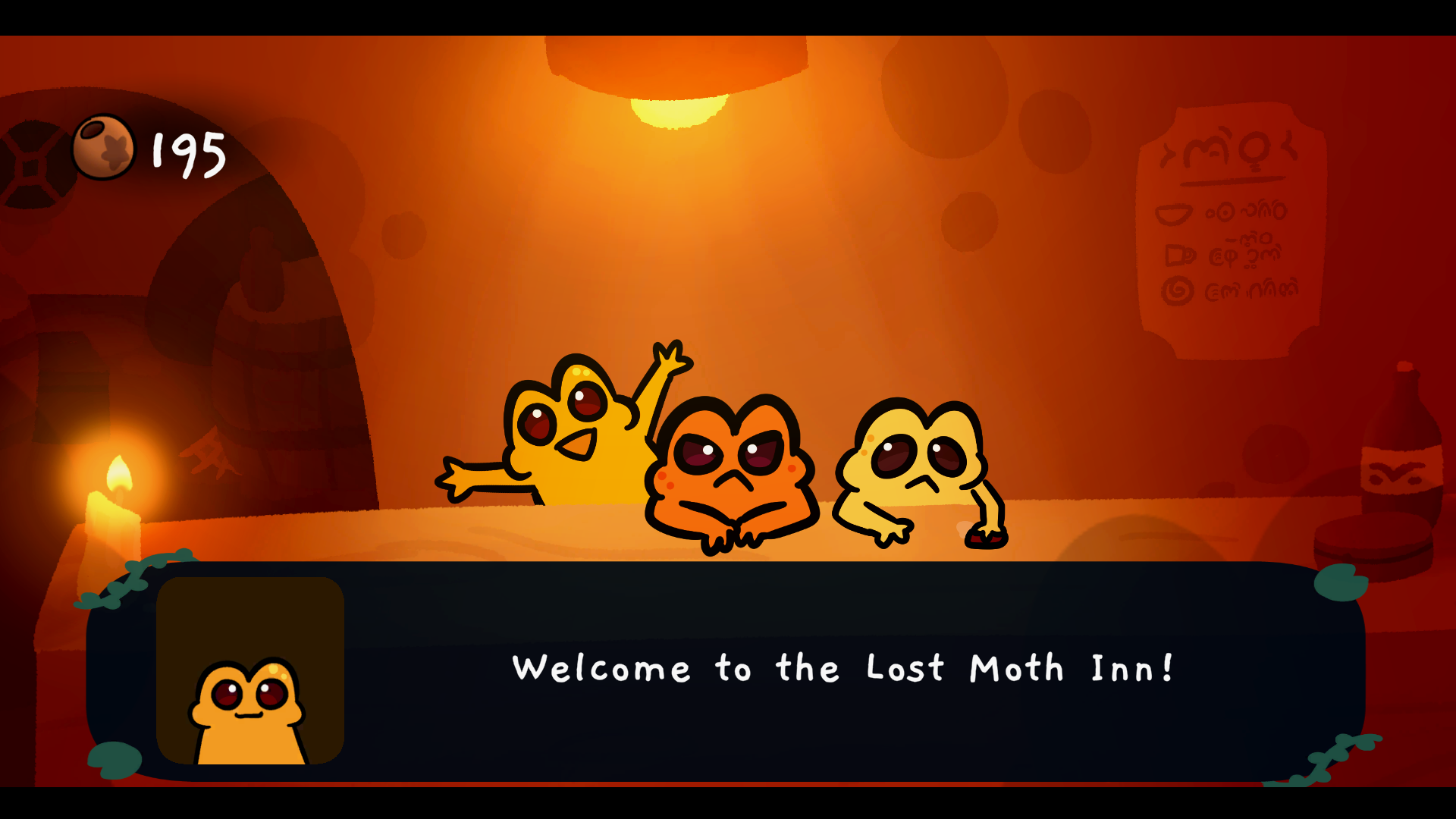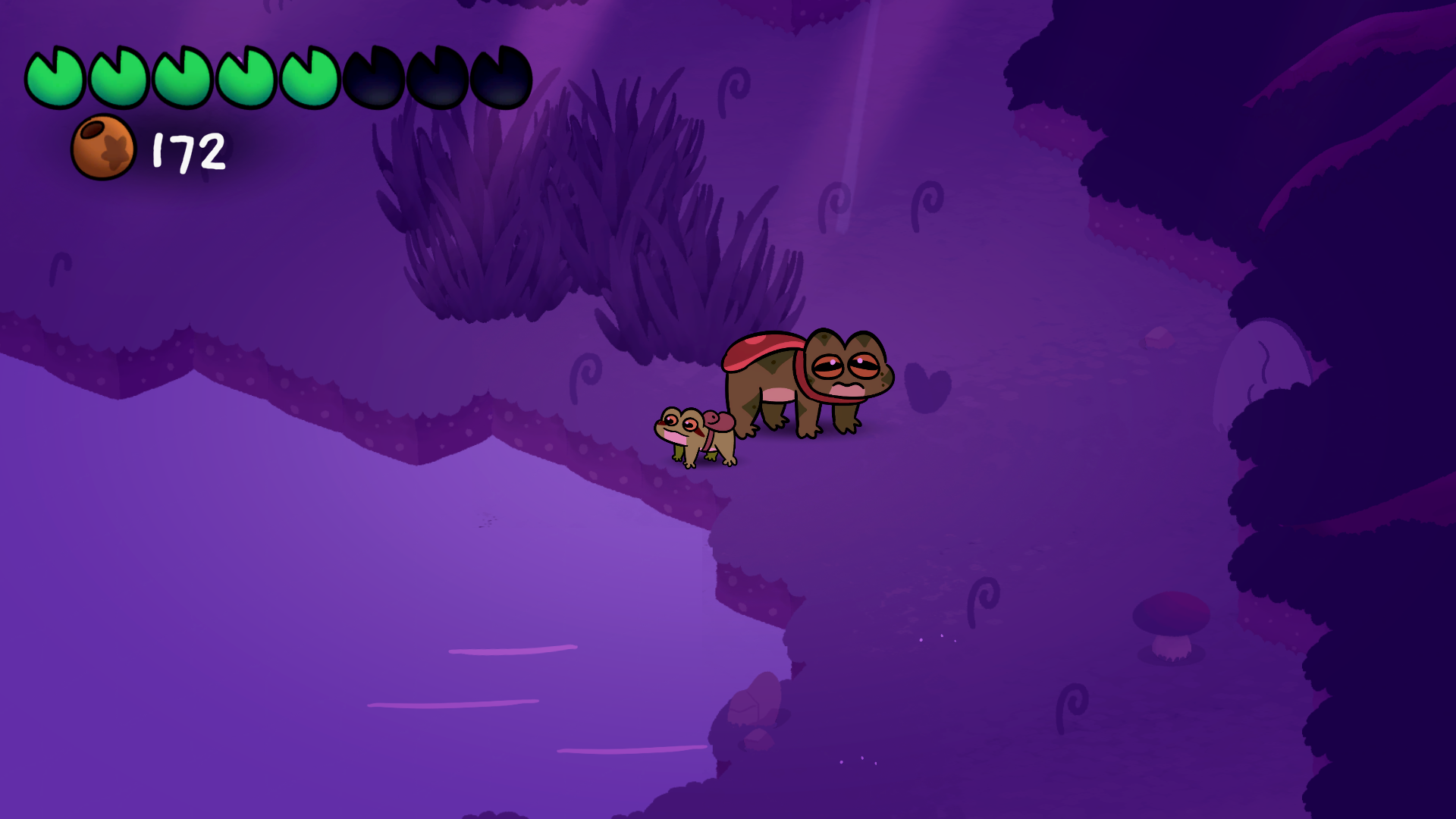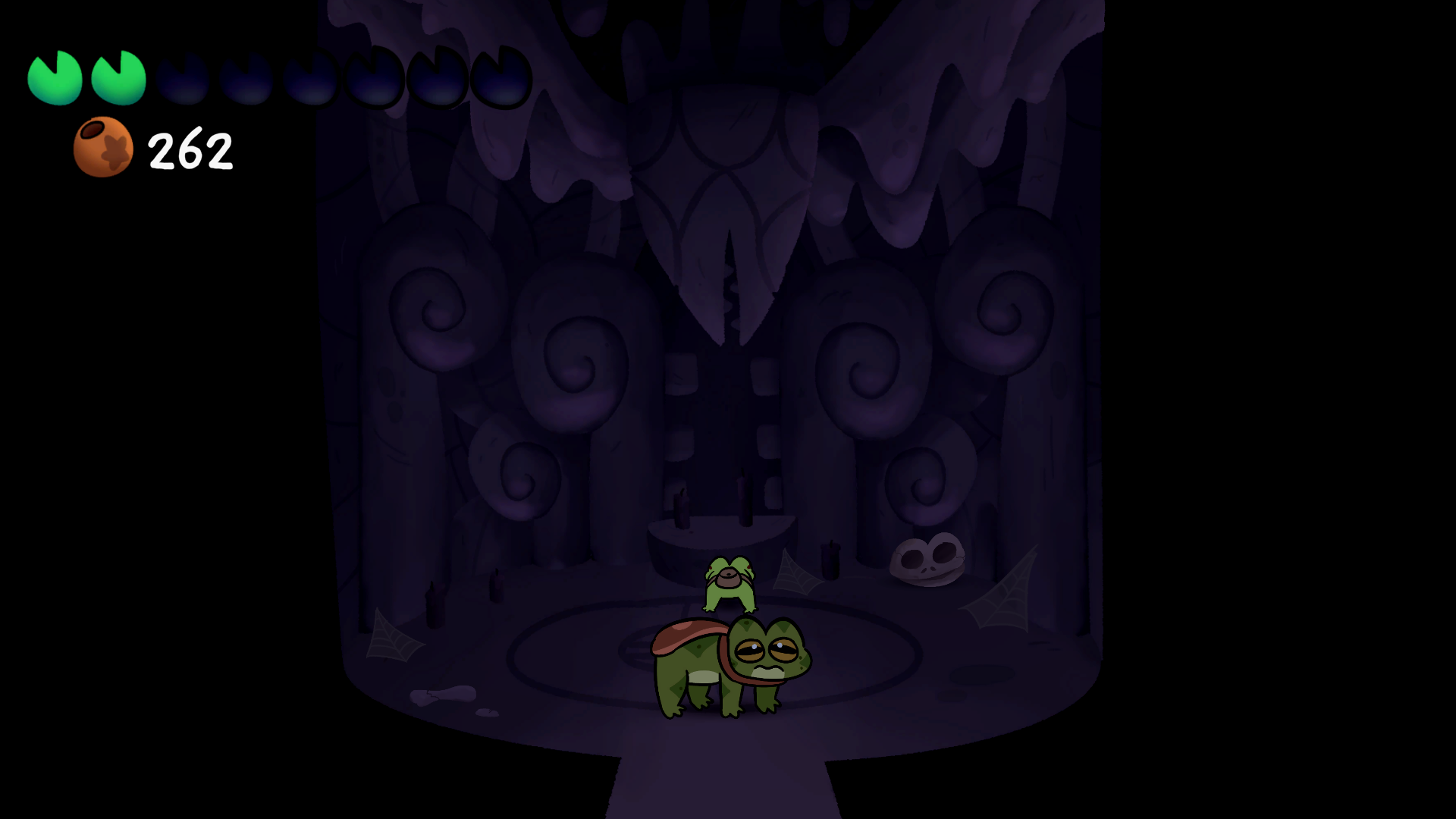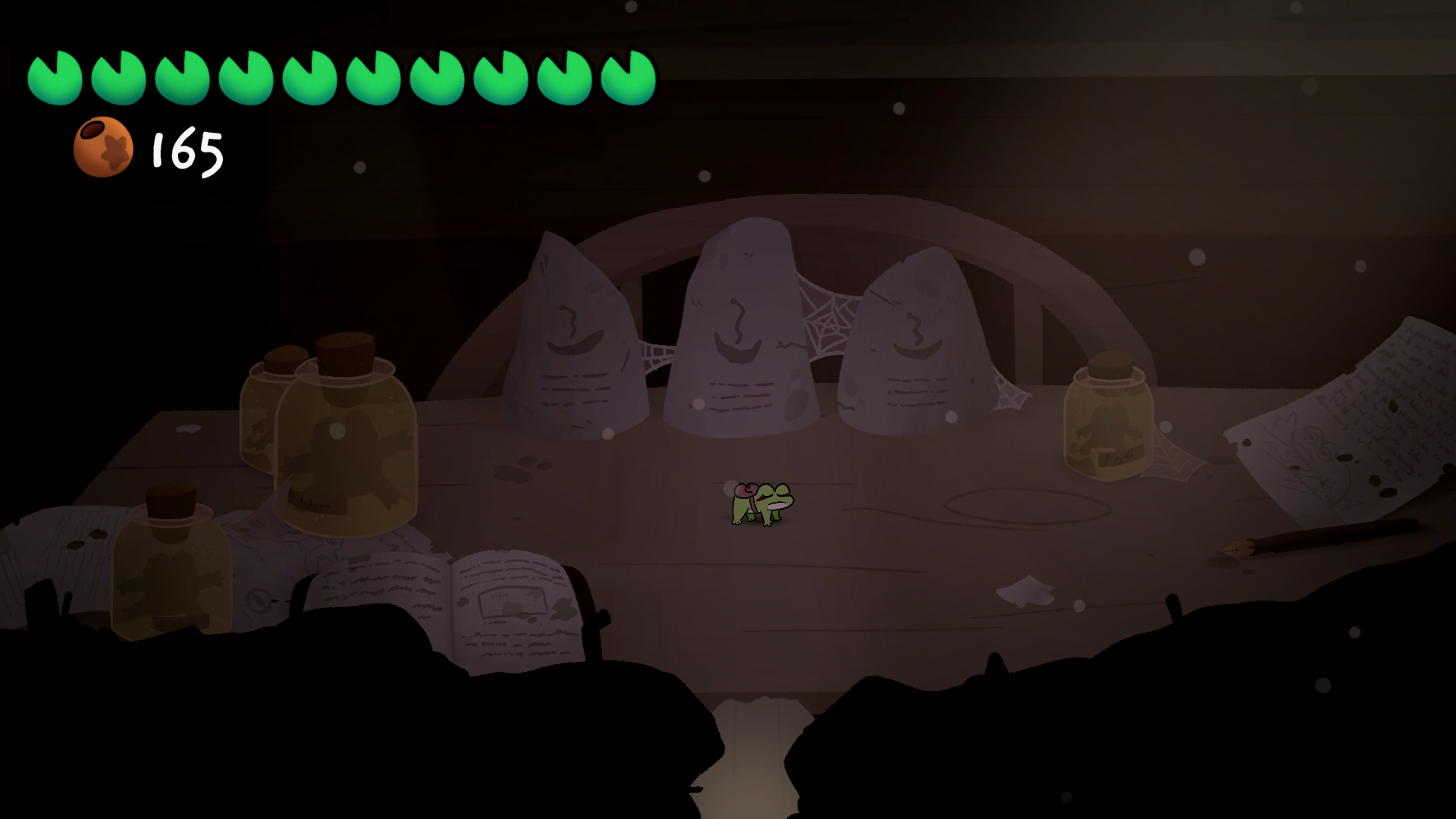Strange Gaming Diaries: Frogsong, by Frogteam Games

so, in the interest of preserving some degree of journalistic integrity, I feel the need to declare this at the start: this game was made by my friend! they even sat in a voice call with me while I was playing it, occasionally sharing thoughts about certain elements and bouncing off of thoughts I voiced out loud. it was fun, and helped me get into a thoughtful mood about things!
part of why I love games developed by very small or completely solo development teams is the constant understanding that everything you see was a conscious and personal decision. someone decided to put everything into the video game! and it creates all these little wrinkles in the play experience that I find endlessly charming. I've talked about this on streams before, but I honestly love it when I encounter some minor bug or mistake in an independently-developed video game I'm playing. it reminds me that these things are made by people, y'know?
frogsong, by that metric, is one of the most wrinkly games I think I've ever played. front to back, it's a story told and a world created by someone who had a bunch of neat little ideas that they wanted to make happen! there are fun little moments you have with the exploration like needing to dodge giant pinecones or discovering that some of the enemies are hiding in the bushes or meeting any number of off-beat characters like the giant toad who asks for worms or the guy that gets you the worms or the recurring character of espo who shows up with random garbage that they're convinced are items of great power. often these kinds of games that are filled with an assortment of bits like these can end up feeling a little bit disjointed, but the solid and grounded worldbuilding combined with the writing style that's both quirky and actually has a solid grasp of comedy ties it all together into a surprisingly cohesive whole.
there are, of course, a lot of bumpy patches—the game very much feels like it's held together with glue and prayer, with lots of minute errors like being able to see out of bounds in one specific part of the map or misspelling the word "odious", as well as a broadly rough-hewn quality to mechanical elements like the feel of movement and collision/hitboxes. gameplay in general is pretty strongly just okay, not being anything remarkable but at least not being actively bad. it's a perfectly serviceable way to fill the space and let you ruminate on plot happenings, though I do feel like some areas are maybe a bit longer than the amount of stuff that was available to fill them out, with the gloaming grove especially coming to mind.
that said, not only did a lot of moment-to-moment bits of fun like the ones mentioned earlier get me through it, but the story and worldbuilding is compelling enough to give me a lot of motivation to see it through. chorus's story and journey to self-assurance is a well-told affirmation that perseverance and dedication to your own heart always wins out over the need for status and recognition. I found it very interesting in hindsight that chorus never actually joins the defense guild until the very end of the game, but that it doesn't stop them from doing everything they can to defend their new home once serious danger starts to arise. sure, they start out with big dreams of joining this cool group of warriors, but they quickly prove themselves to be dedicated to their loved ones and their community above all else, and it makes them a great hero to be steering around!

most of the other characters fill pretty familiar roles, with bufo being your typical old wise mentor figure and basalt being a leery disapproving elite in the group chorus wants to join, but they're given enough elaboration to their characters to elevate them from their stock roles. bufo isn't just an old mentor, he's also a war veteran who did some pretty fucked up things back in the day and seems to have complicated feelings about it. basalt not only goes through the expected arc of eventually learning to trust and respect chrous's strength, but actually has a very understandable reason for doubting them that gets revealed later in the game.
and then there's rana, who makes for a perfect companion character for chorus themselves as someone who's also trying to fill some pretty big shoes in being the chosen successor to elder bufo, and who similarly struggles with feelings of unworthiness and not feeling prepared for the role she knows she'll have to fill. her story nearly made me cry about halfway through the game. it's good! all these characters are just good!
a lot of the plot goes through the motions that you'd expect it to: move into town, get closer to locals, foil plots of a fascist dictatorship, prove your worth, learn your place in the myths of the world, all that good rpg stuff. but there are a lot of turns the game takes that I wasn't expecting and that demonstrate a lot more depth to this game's storytelling than just being a romp through a bunch of wilderness as the cutest frog ever, and to talk about those, we need to...
⚠ ENTER THE SPOILERZONE ⚠
I mentioned before that bufo had done some dubious things during the war, and while I'm still gonna get to that later, it bears repeating that one of the major characters in this story is a war veteran! and that there are a number of other scarred or otherwise disabled characters as a result of this and other conflicts! the game might be cute and family friendly, but it's not pulling its punches with its discussion of things like war and the price of imperialism, in a way that I found very refreshing.
and that's not getting into the actually genuinely fucked up things in the game, like when you bomb a wall in the gloaming grove expecting a collectible or something only to find this place:

you collect an item here that informs you that this is a shrine to the bloodchild constructed by a cult in search of immortality, and like, it doesn't say that they do blood sacrifices, but I came out of it with the feeling that maybe they do blood sacrifices. this doesn't have any bearing on the greater plot at all, but is a recurring bit of worldbuilding that pops up adjacent to the setting's central creation myth, mainly telling the story of how the bloodchild was the first spawn of the two main creator gods but started killing everything and had to be dealt with.
it's deliberately jarring compared to the friendly tone of all the other mythology, but not only is that pretty true to the way mythology works, there's even dialogue from chorus suggesting that this is intentional; that the local religion purposefully mitigates things like that one problematic part of their faith where their benevolent creator goddess killed another child of hers for acting in defiance of her designs for the world in order to appeal to more people. it plays into themes of suppressing oneself and doing questionable things for the sake of acceptance that actually comes up quite a lot through the game—more on that later.
also, I don't really have any other place to bring it up and it isn't really relevant to the plot or the broader narrative themes or anything, but shout out to the twisted queen story in the copper city library for being a genuinely compelling horror short story that bee just decided to write and put into their video game. I was scrolling through it with the kind of gripping tension that I would an actual book, and the willingness to put something that spooky and auxiliary into the game did a lot to make it feel closer to life.
on another note, it becomes apparent pretty early on that frogsong takes place in a human civilization, with a lot of our detritus being recontextualized by the much smaller-scale amphibian society. not only are there espo's assorted relics, but there are also things like the giant manmade tower you see in the distance, or the gravestone that ended up becoming a symbolic focal point for the local religion, or the fact that the last area of the game is a giant abandoned factory.
(fun fact on that note: the general shape of the game world is based on stanley park, which is also coincidentally the same park where the inscryption floppy disk was buried. we both lamented the missed opportunity to have included an easter egg about it, especially since there's a place in frogsong that roughly corresponds to its exact coordinates—bee didn't know anything about inscryption before frogsong's release.)

this is a concept that I was very familiarized with by my previous experience with bug fables, but that was still used effectively enough to get delighted laughs and gasps of surprise out of me. the human-sized house at the end of the swamp floored me just from how well it captured the vibe of something on a scale that was utterly alien—but it wasn't! that's a human house! I live one of those! and that there are those dual impressions being made is utterly fascinating!
so, of course, when I started hearing about the snnikt and was told by bufo that he made it up as a wartime scare tactic, I was primed to think that if it was even real and wasn't just propaganda being repurposed by lord lithos to suit an agenda—which did definitely seem like a plausible thing for him to do—that it was something similarly mundane that the frogs had just mythologized. my first thought was that it was maybe a lawn mower, because of the name seeming like a cutting sort of onomatopoeia.
then you enter the nightmare sequence, and this immediately becomes complicated.
before getting into the way it ties into narrative, I have to say that the entire sequence with the fucked up underwater nightmare world or whatever was going on there was fantastically handled, with every bit of its design communicating unknowable terror while not betraying the stylistic integrity of the rest of the game. it's also really scary how long I had to spend wandering around not knowing anything that was going on or what I was seeing, with more and more details like readable signs and interactable npcs showing up but only leaving me more confused. I was seized by the kind of confused fear that a video game hasn't made me feel in a very long time.
at the end of it, you encounter some ambiguous monster, and chorus concludes that it definitely has to be the snnikt. and like, okay, whatever happened there definitely didn't seem natural and the way that the rest of the town doesn't believe chorus when they tell them it was the snnikt is obviously leading up to a payoff where whatever the hell that thing was totally was the snnikt...but there have simultaneously been a lot of signs that things that are thought to be supernatural are usually just poorly understood manmade technology.
fuck's sake, the legendary sunblade supposedly capable of killing the snnikt is just a thumbtack jammed into the tip of a fountain pen. and yeah, after this you're spoken to by some weird shadow-chorus that preys on their inner doubts and frustrations, but it happens at an emotional low point in the story, so maybe it's just some allegorical inner demon that we disprove and fight off in some emotional climax later. that's usually how this thing goes!
even all the way up to the climactic fight with lord lithos, who's basically just a big guy that jumps around and swings an axe at you, there's no real indication that this snnikt business is anything genuinely otherworldly. just about everything up to this point has had some kind of scientific or archaeological explanation, and as I defeated lord lithos, I was ready for the truth to be revealed and to fight a lawn mower or something.
and then you learn that actually, no, the snnikt is just straight up a fucking shadow demon. it does some dimensional fuckery to cut you off from basalt, takes on the shadow-chorus form to try and convince chorus to become its vessel for the sake of power and recognition, and explains that it has been waiting for a chance to emerge into this world after having consumed all the rest of its kind that it saw as weak. then it turns into a giant fucking shadow deer thing and you fight a goddamn final boss from a kirby game and it's the most hyped I think a game has made me feel in a really long time.
it's such a fun and well thought out subversion of the previously established precedent, that this very grounded and realistic world that definitively has no magic and has a lot of unexplained shit that's actually just known human objects and phenomena has actually had supernatural beings the whole time! and what's even better, the game purposefully draws on that apparent conflict of assumptions to create tension in the game's second half, and offer some genuine weight to the part of the plot where people don't believe chorus when they say the snnikt is real. normally those kinds of plot twists can get needlessly frustrating or contrived with how obvious the truth is to the player, but by making the apparent truth directly contradict a lot of established precedent, it makes the reactions of the characters around chorus more believable and creates a very compelling uncertainty that persist all the way through to the very end. it's fucking great stuff, and made the ending so utterly fantastic to get to!
after the very end, if you go the bestiary (which, by the way, love it when a game has a bestiary) and go to the new entry on the snnikt, you don't find any stats or a flavorful little description like normal. you just find one of the hardest lines I've heard from a game in a while:
The tragedy of trying to be the best is that there will always be someone better than you. You will never be satisfied until you are a god.
this is, of course, in reference to the stated backstory of the snnikt: they're a being obsessed with strength and worthiness, who assumes that this is the only reasonable mindset anyone can ever have and thus assumes it of chorus after seeing what they end up going through. but as I described before, chorus eschews that mindset and seemingly treats recognition as an afterthought well behind doing the right thing for its own sake.
this contrasts with not just the snnikt, but other characters as well: lord lithos is a character who feared becoming irrelevant and worthless upon his death so much that he was willing to summon a demon just to ensure he'd never die. there's that business with the religion that I was talking about before, and even elder bufo has a little character moment where he admits that he lied about losing his leg in the war to appear stronger to the others around him, but is inspired by chorus to tell the others the truth before his own death.
sure, frogsong is a story about believing in yourself and also a queer narrative about finding the people who are willing to accept you, but what I find most compelling is this recurring narrative theme of these toxic ideas of worthiness and the necessity of rejecting them. a lot of characters in frogsong are fixated on the idea that they have to do something to prove themselves—this is even the mindset chorus has early on into the story! but it ends up being proven that this mindset only begets further dissatisfaction and the gradual destruction of everything around you to fuel that miserable goal. chorus gets their shiny badge at the end of the story, sure, but it's not really framed as a reward for saving the world from an apocalyptic demon so much as an acceptance into a community at the end of a time of conflict.
the tagline of the game calls it "a game where it's okay to be small," and that not only refers to chorus's literal size, it also has a clever double meaning in that it's okay to be humble, overlooked, or even completely unrecognized by some nebulous validation-granting greater world if it means doing what you love with the people you love. bee was telling me that in a hypothetical future timeline years after the events of frogsong, it felt wrong for chorus to end up becoming the leader of the defense guild or otherwise anybody important, and I feel like that's a really captivating dedication to defying the idea that success is a thing inherently deserving of rewards and recognition, or that recognition is meant to act as a signal that someone is inherently worthy of respect and status. in a world often dominated by personalities whose actions and opinions are treated as valid by things like how many people played their video game or are subscribed to them on youtube, it's important to maintain a healthy attitude about these things by reminding oneself that, indeed, it's okay to be small.
support bee on patreon!
visit bee's website!
there's a new game coming soon...catch more news here!
buy the new artbook! it's really neat!
keep up with bee on bluesky!
Comments
note: these comments are manually moderated, so they have to go through me before they become visible!